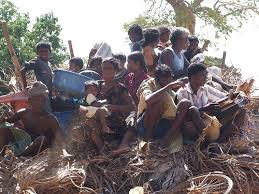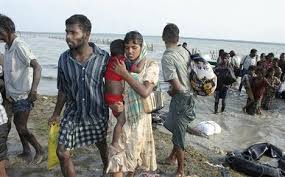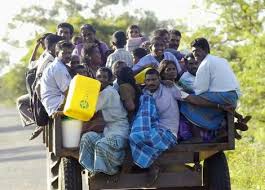


Sri Lanka is facing a continued post war humanitarian crisis. Adrian our Regional Manager for South Asia writes:
In February of this year before the formal end of hostilities in May, I visited Sri Lanka including the East Coast and was very disturbed by hearing many stories of human suffering as a result of the civil war. Thousands fleeing the violence only to be caught in the crossfire and either killed or horribly injured – with no access to medical treatment. Those that made it were sent to refugee camps which they were not allowed to leave and where relief organizations were denied access. I met an Anglican pastor who did not know if his parents and other close relatives from the conflict area were alive or dead. I visited villages in areas of resettlement, where there was fear of attack by unknown gangs. The residents in one village were going to a funeral of a young man murdered in his home by one such gang two nights before.
But I was also greatly encouraged by the active response of the Church of Ceylon – on the ground level to provide relief, counseling and support among the affected communities and individuals, and also nationally by its strong advocacy voice, and by their longer-term strategies for promoting peace-building and conflict transformation. The dedicated labour of Rev. Chandran Crispus and his team among internally displaced and recently resettled people in the Batticaloa area was one example of how the church is responding practically and effectively in these ways. They desperately need a vehicle to help to facilitate this work.
Nearly 80,000 people have died in 26 years of conflict in Sri Lanka in what has been Asia’s longest and possibly nastiest civil war. There are an estimated 300,000 Internally Displaced People and many are living in what are described by some as more like concentration camps than places of refuge. At least a million landmines have been laid. Thousands of children have been forced to become soldiers. In the final months of fighting at least 7,000 people were killed (and some local estimates such as those of the Roman Catholic church put the figure at 20,000) and 40,000 injured.
Now the government has achieved a military victory over the rebels. For the first time since 1983 the entire island nation is under government control. A relentless military offensive conquered 15,000 sq km which the rebels ran as a separate state in the north and east. But there is a huge task now of reconstruction and rebuilding as much of the land of the north and east have been laid waste by fighting, destruction of buildings and infrastructure, landmines and war debris.

But it is not just a matter of physical rebuilding. The Rt. Revd. Duleep de Chickera (Bishop of Colombo) has called for
“prayerful, purposeful and collective steps towards an integrated, united, and just Sri Lanka that has eluded us for decades. We must become a nation in which every woman, man and child, regardless of religion or ethnicity, is made to feel equal, free and proud to call themselves Sri Lankan. For this to happen we will be required to address the grievances of all communities, eliminate social fear and suspicion, restore the people’s confidence in law and order and good governance, and respond to the current economic challenges with immediate attention to the needs of the poorest, the displaced, the helpless, and the harassed amongst us.”
If anyone is interested in donating towards the CMS response to the Crisis then there is a link on the website (take a look at the Sri Lanka focus page) and there is more from Bishop Duleep
But above all please continue to pray for Sri Lanka

No comments:
Post a Comment